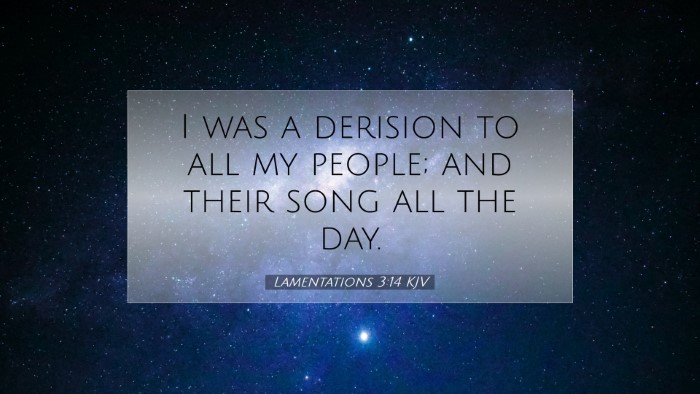Lamentations 3:14 - Bible Commentary
Verse: "I am become a derision to all my people; and their song all the day." (Lamentations 3:14 KJV)
Introduction
The Book of Lamentations presents profound expressions of grief and sorrow, particularly in light of the destruction of Jerusalem. In Lamentations 3:14, the speaker articulates a painful reality where their voice has become a source of ridicule among their peers. This commentary seeks to draw insights from various public domain sources such as Matthew Henry, Albert Barnes, and Adam Clarke to delve into the theological and contextual implications of this verse.
Contextual Insights
Lamentations is traditionally attributed to the prophet Jeremiah and serves as an elegy lamenting the fall of Jerusalem. This particular verse appears within a section that highlights personal suffering amidst collective judgment. Matthew Henry notes that the speaker feels overwhelmed by derision and scorn, showcasing the deep psychological and social ramifications of grief.[1]
Albert Barnes adds that this derision reflects not only personal anguish but also a communal response to calamity, where the individual is subjected to mockery by their own people.[2] Thus, it underscores a communal identity intertwined with personal despair.
Theological Reflections
This verse raises essential theological themes concerning the nature of suffering and the human experience in relation to divine providence. The phrase "I am become a derision" can be interpreted as a manifestation of God’s judgment upon Israel for their ingratitude and rebellion. Adam Clarke elaborates on this idea by suggesting that such ridicule serves a dual purpose; it reflects the internal state of the speaker and simultaneously acts as a call to the people for reflection on their relationship with God.[3]
The derision experienced by the speaker can be seen as a foreshadowing of Christ's own derision in the New Testament, emphasizing the universal nature of suffering and mockery faced by those faithful to God's calling.
Emotional and Psychological Dimensions
Henry poignantly describes the experience of disgrace as akin to being 'made a song' among the people, emphasizing the cruel irony of those once esteemed now subjected to humiliation. This verse serves to portray the deep emotional turmoil of exile, where songs of joy have been replaced with songs of scorn.[4]
Barnes further comments that this state impacts not only the spirit of the lamenter but also illustrates the broader psychological impact of national tragedy on collective identity and individual psyches.[5]
Lessons for Today
Lamentations 3:14 invites readers to engage deeply with the themes of suffering, derision, and the mercy of God. For pastors and theologians, this verse serves as a reminder of the importance of empathy towards those suffering from ridicule or grief due to sin or tragedy. Henry emphasizes the need for understanding, noting that every adversity faced has a place within the broader narrative of redemption and restoration.[6]
- Empathy and Compassion: Recognizing the shared human experience of suffering can foster community and support among believers.
- God’s Sovereignty: Understanding that God allows suffering for various purposes helps in interpreting personal and communal trials.
- Redemptive Suffering: The acknowledgment that mockery and shame may also lead to greater recognition of God’s grace and restoration.
Conclusion
In Lamentations 3:14, the lament expresses a deep and personal pain rooted in wider societal issues. The commentary from public domain sources provides a rich exploration of the emotional, theological, and psychological dimensions of this verse. For pastors, scholars, and students, this verse is not merely a reflection of despair but a profound invitation to wrestle with the complexities of faith amidst suffering and to seek God’s restorative grace. As we reflect on this passage, we are reminded that even in the depths of despair, hope can prevail through divine mercy.
References
- Matthew Henry - Commentary on the Whole Bible.
- Albert Barnes - Barnes' Notes on the Bible.
- Adam Clarke - Clarke's Commentary on the Bible.
- Matthew Henry - Commentary on the Whole Bible.
- Albert Barnes - Barnes' Notes on the Bible.
- Matthew Henry - Commentary on the Whole Bible.


